

They explained it all pretty well imo


They explained it all pretty well imo


i was excited (for more primary sources  until i read
until i read
But he was expelled from the party the following year [1959] over his criticism of the Great Leap Forward, an industrialization program championed by Mao that led an estimated 30 million to 40 million people to die of starvation in three years. During his 20 years in exile, Li was imprisoned in a labor camp and spent eight years in solitary confinement.
He’s not even there for the most interesting (and most in need of good contemporary primary sources!!! Everyone and their mother has written about the civil war!!!) period who cares about this guy 


I do not think writing fiction for entertainment art is “falsifying history”.
If the setting is “historical” or “realistic” it is imo, bc, as I said above, you have to present history reductively, as a compelling, coherent narrative and with the unknowns smoothed out or filled in by imagination. (And all that is assuming the writer has done research into the topic—most artists dont)
The history of knowledge of druids, witches, the middle ages, the middle east and more demonstrates how distorted views can become when the tendencies of capitalist media are allowed to run rampant. Anti-indigenous racism are more serious examples of how these distortions can be harmfulm.
More general fiction outside of “historical fiction” isnt what the post is about, so idk why youre bringing it up. If theres dragons, magic, etc and it doesnt take place in “real life” people are significantly less likely to confuse stuff in it for real facts about histories or cultures.
giving this entire entertainment sector to the capitalists to falsify history in the way they want it with literally no counter balance.
As I understand it, that’s a large part of why the firewall exists isnt it? So that the western created ideological products dont become the cultural mainstream?


Im glad you liked it 


“Falsification of history” (or science, etcetc) isnt a thing I get the impression the cpc wants to support (and frankly i dont support it either, but im just one poster)
“Cultural fight on this front” cultural fights to falsify history in the name of profit-driven consumer-entertainment dont sound like things historical materialists should be engaging in. Falsifying the history we’re materially analysing is a recipe for disaster. Frankly the whole idea of a “cultural battle” that can be fought, lost or won reeks of the german ideology Marx was criticising:
It was a revolution beside which the French Revolution was child’s play, a world struggle beside which the struggles of the Diadochi [successors of Alexander the Great] appear insignificant. Principles ousted one another, heroes of the mind overthrew each other with unheard-of rapidity, and in the three years 1842-45 more of the past was swept away in Germany than at other times in three centuries.
All this is supposed to have taken place in the realm of pure thought.
Certainly it is an interesting event we are dealing with: the putrescence of the absolute spirit. When the last spark of its life had failed, the various components of this caput mortuum began to decompose, entered into new combinations and formed new substances. The industrialists of philosophy, who till then had lived on the exploitation of the absolute spirit, now seized upon the new combinations. Each with all possible zeal set about retailing his apportioned share. This naturally gave rise to competition, which, to start with, was carried on in moderately staid bourgeois fashion. Later when the German market was glutted, and the commodity in spite of all efforts found no response in the world market, the business was spoiled in the usual German manner by fabricated and fictitious production, deterioration in quality, adulteration of the raw materials, falsification of labels, fictitious purchases, bill-jobbing and a credit system devoid of any real basis. The competition turned into a bitter struggle, which is now being extolled and interpreted to us as a revolution of world significance, the begetter of the most prodigious results and achievements.


Idk if this is true or not, but if it’s not true it should be imo
way too much ‘common knowledge’ of science, history, politics in the west (i’ve never lived outside it so idk what its like outside) is based on what people see on tv/fiction/twitter/etcetc, which is made 1. by people without expertise in the subject 2. by people aiming to entertain (and profit) more than to inform.
This creates extremely distorted views of history. It communicates outright wrong or fabricated information mixed (without distinction) with truths for extra confusion. It communicates idealist ways of thinking about history, as great man theory abounds because of literary requirements for characters and a compelling narrative. And then such media usually portrays knowledge of history as more complete/settled than it actually is, because long descriptions of theories and countertheories make sales plummet


Precisely how much worse must be the conditions of the average liberal before they convert, then? There is no bottom to the conditions of the working class, and there is no ceiling to exploitation. Things are ok in many places but they’re becoming bad in a lot of the Western world, even in America, for average middle-class families.
An insightful question. A comparison of the conditions of the western working class (as we’ve observed in our lives and studies) to those of the English proletariat in Engels’ and Marx’s time would be illustrative as to “how much worse must be the conditions” before the liberals stop liberalling so successfully among the workers.
Mostly from Engels, Conditions of the Working Class in England. I’ll type up some highlights in addition to the full images.
Living conditions:
Literally bailing the river water out of your dwelling every morning

20 people to a 2room+attic+basement residence. 120 people to a sometimes nonfunctional privy. Ireland was even more crowded.
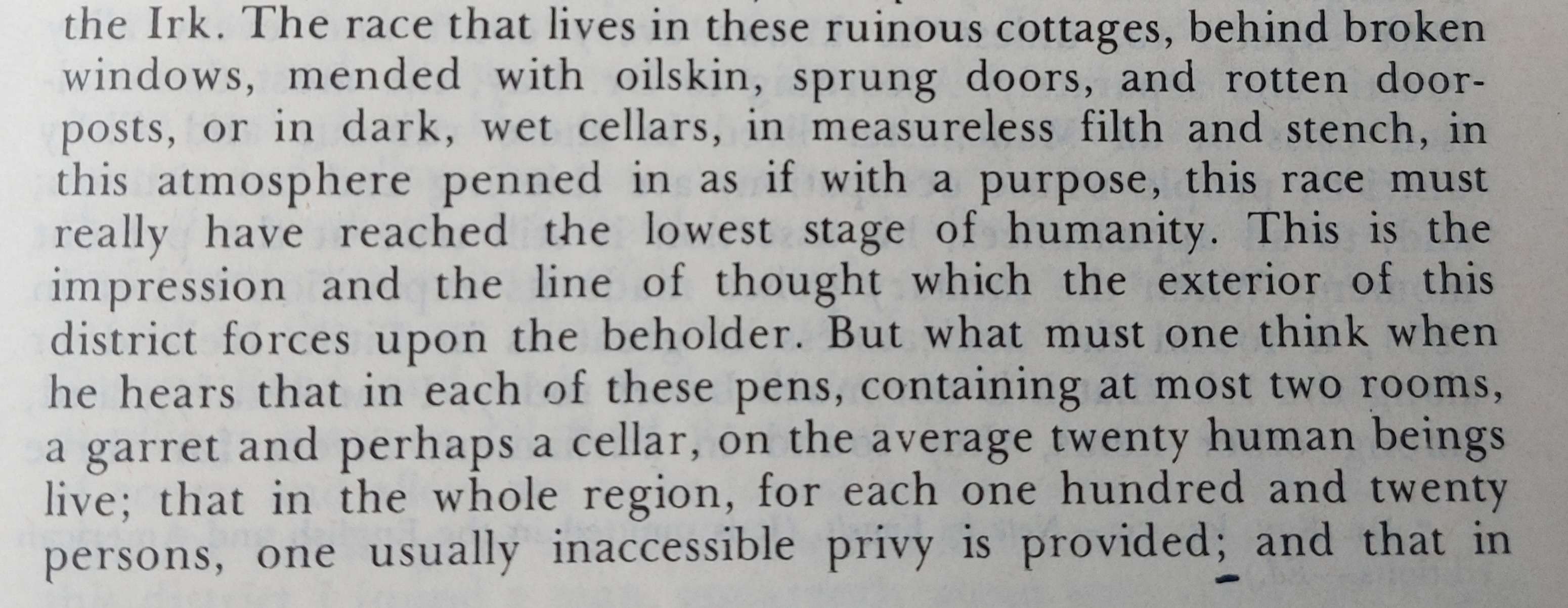
food in stores:
Old, rancid, rotting meat. Rotting vegetables. Mouldy cheese.
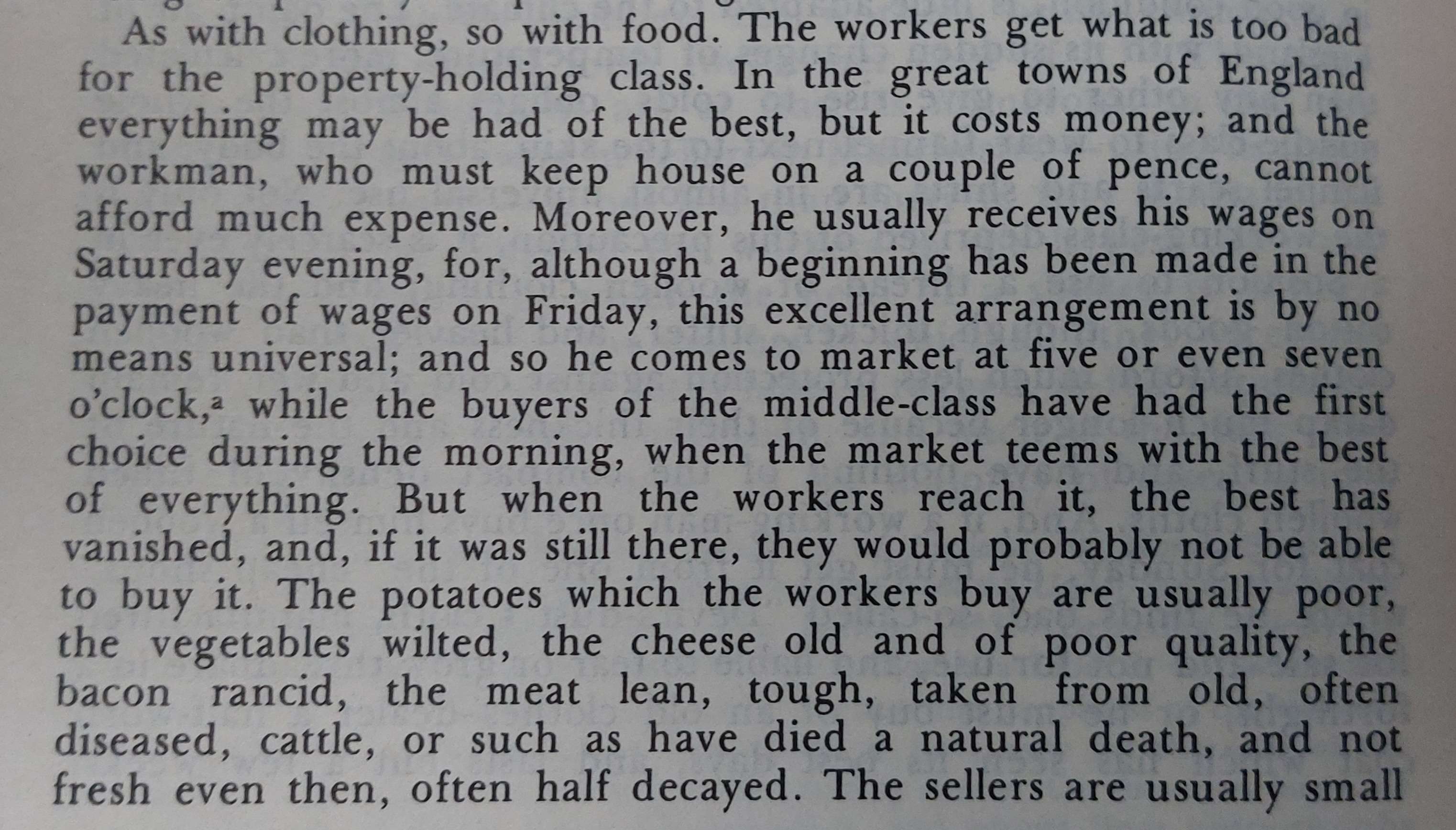
Soap-refuse mixed in with sugar. Dirt and sheep fat mixed with cocoa.

From Capital; cobwebs, cockroaches, sand and alum in bread.

Vagrants, tramps, homeless, beggars and the like
Poor rounded up and thrown into workhouses with conditions similar to or worse than prisons. Families broken up. Hard labour (harder than regular wage labour) but useless (so as not to distort the market). No visitors, gifts, leaving, etc without permission from the inspector.
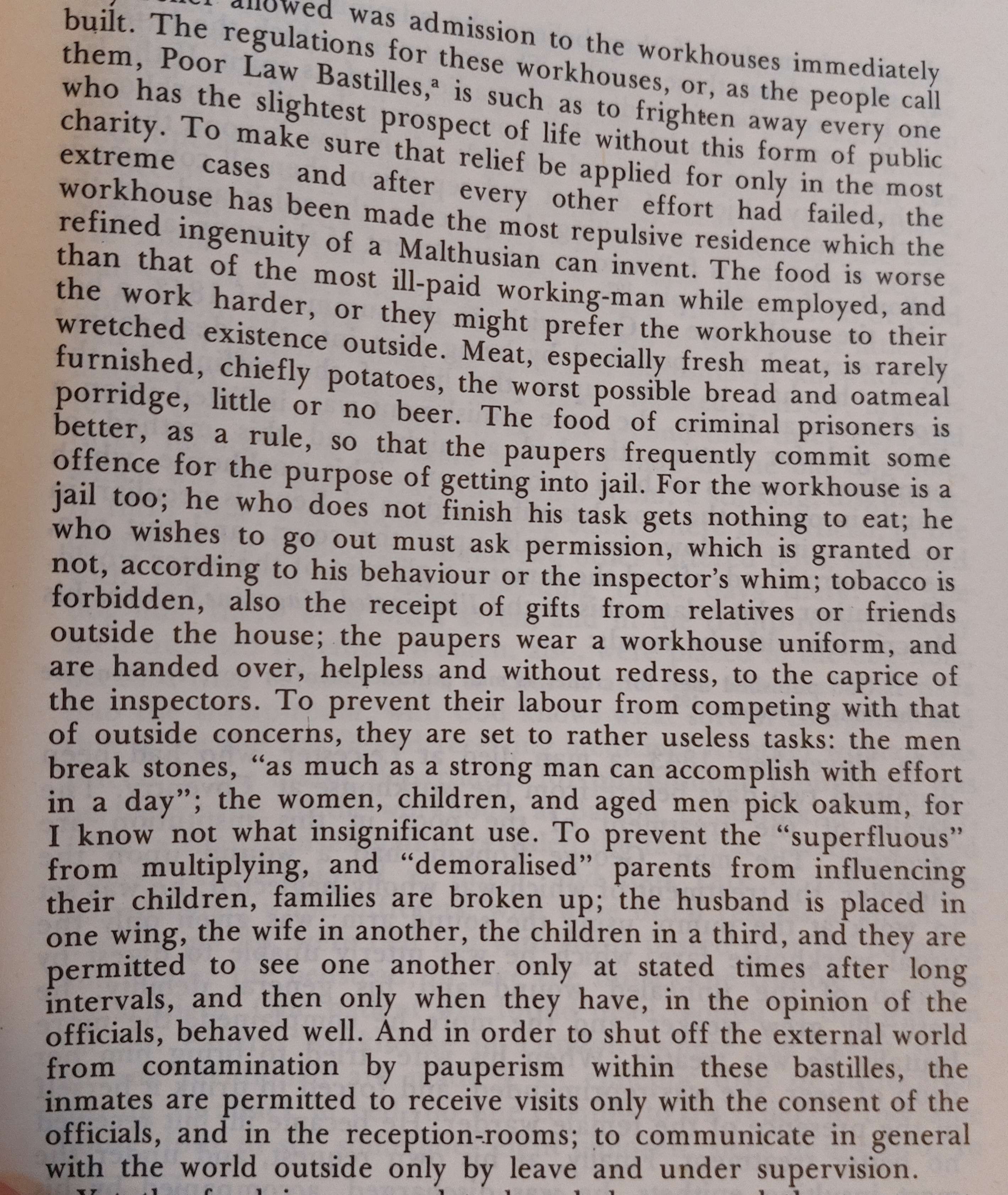
Some choice examples of conditions in the workhouses include children being locked in dark rooms with corpses as a punishment for bedwetting

Such punishments were common, and the rooms crowded, cold, filthy, and the punished youths often stripped naked

As for treatment of the old and the dead?

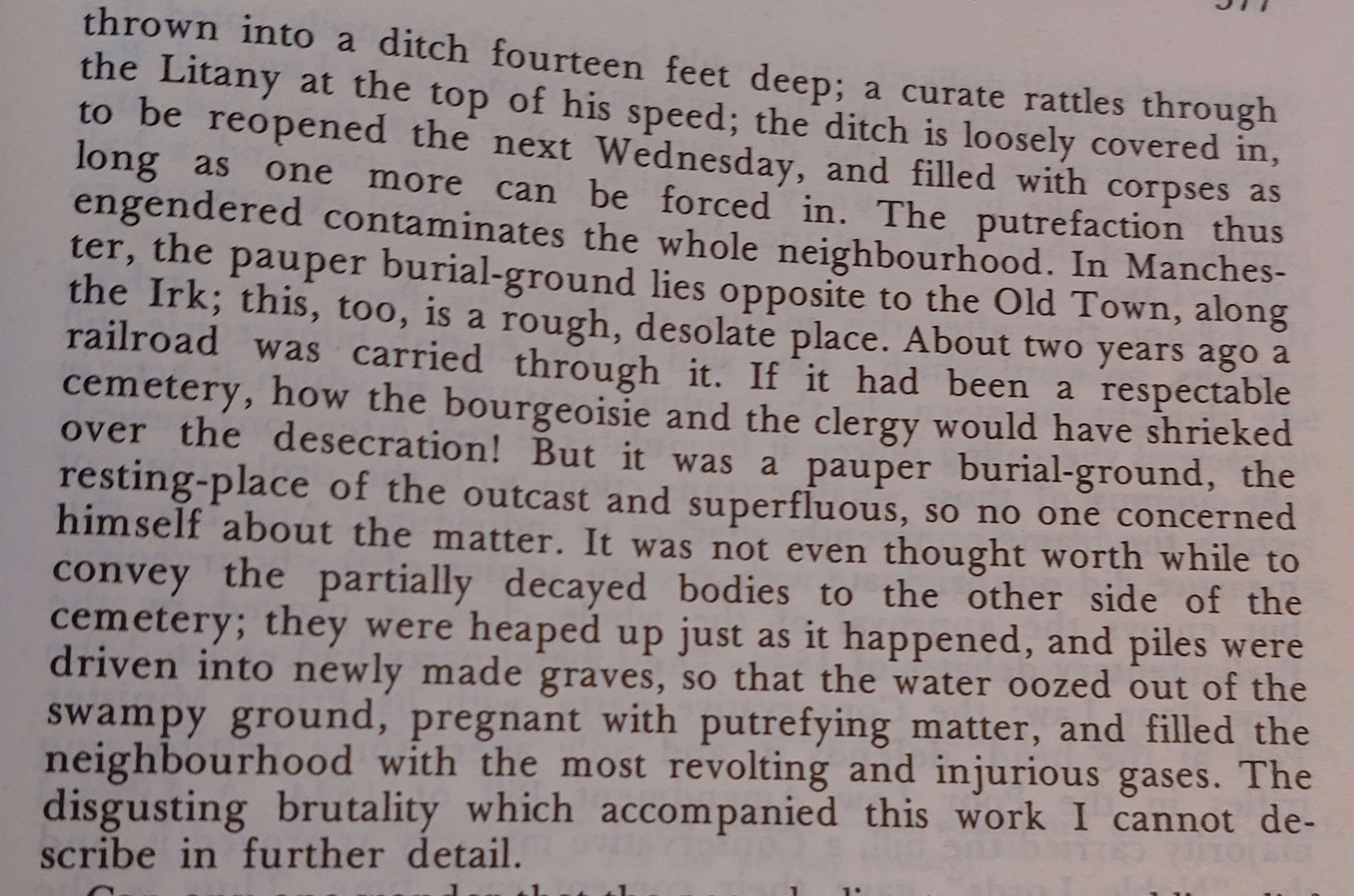
As for working conditions, I’ll just post one screenshot from working class bc this is getting long
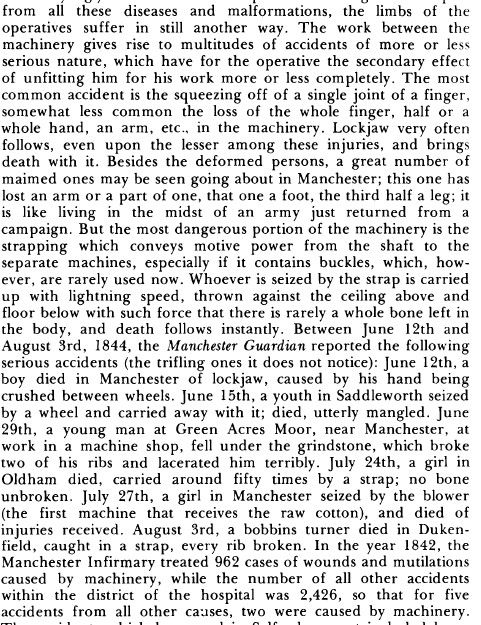


jumping on the “also autistic, this describes my experience” bandwagon


doesn’t invalidate his previous work, but damn that sucks


Ironluck is real

I already have full infinity so it wont be used, buts its neat to have


picard isn’t nearly cool enough to do that (he is a loser bureaucratified careerist elitist shitstain). He would be too afraid of the damage to his career
Kirk otoh would personally punch every head of state in the face before arming the dispossessed with laser pistols (as he does in
“The Cloud Minders”)


the more i read about history the more convinced i become that ‘fascism’ (merger of economic and political power for bourgeois ends) is the default state of capitalism


Too real


He tried, but if he spoke plainly he got beaten up and if he spoke in parables no one understood


holy shit paul is the nereveraine


5 In the Law Moses commanded us to stone such women. Now what do you say?” 6 They were using this question as a trap, in order to have a basis for accusing him. But Jesus bent down and started to write on the ground with his finger. 7 When they kept on questioning him, he straightened up and said to them, “Let any one of you who is without sin be the first to throw a stone at her.” 8 Again he stooped down and wrote on the ground.
Story says he knew how to write (historically, more dubious)


34 “Do not suppose that I [Jesus] have come to bring peace to the earth. I did not come to bring peace, but a sword. (Matthew 10:34)
36 [Jesus] said to them, “But now if you have a purse, take it, and also a bag; and if you don’t have a sword, sell your cloak and buy one. (Luke 22:36)
In the story he tried, didn’t work unfortunately


They weren’t meant to be stayed in much besides sleeping / waiting out rain afaik. If it were warm enough, highlanders generally preferred staying outdoors (sometimes even sleeping outdoors). Sheiling dwellings could apparently be downright cozy though, given a fire, some blankets and stories.
Ahistoricism is not good theory. When you study cultures outside of state formations and burgher societies you find a much wider variety of behaviour, and a greater degree of acceptance of ‘weirdness’, both on an economic level (e.g. various anishinaabe families and even individuals having idiosyncratic ways of harvesting maple sugar, saying “do it properyl” isnt socially acceptable), an aesthetic one (see the vast varieties of clothing that natives chose to wear in the earlier phases of colonialism 1600-1800, for example), or personal or spiritual choices (e.g. some of the prophets of the Nuer in Sudan ate excrement or ashes, some spent hours arranging seashells into neat patterns). You’ll also see variation in cosmologies, and people accepting random teenagers just saying “all the elders stories are wrong, I know how the world was actually created” with little more than an eyeroll. One of the best examples of the acceptence of difference (and why even outside of just being a decent person its important) is the Shawnee prophet Tenskwatawa (younger brother and main theorist and agitator behind Tecumseh’s war). He was basically useless most of his life. He maimed himself early in life failing to shoot a bow properly. He spent the better part of a decade doing the Shawnee equivilant of couch-surfing and bumming food off everyone else while aquiring a drinking problem. He was still socially accepted, if not trusted with any particularly important tasks. Then, one day, he drank a fuck ton and had a vision and turned into an anti-colonial prophet/propagandist. In our society, people would go “lol drunk failure go away”. In his society, people listened and he helped mobilise one of the biggest anticolonial wars against the US.